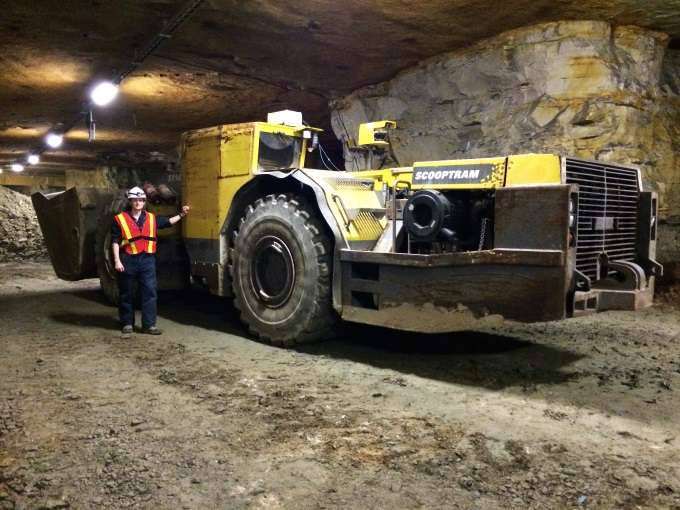Robotic technology promises to improve mining safety

A new piece of mining technology developed by Joshua Marshall (Robert M. Buchan Department of Mining) and his Mining Systems Laboratory has positioned the Queen's researchers as leaders in the field of mining robotics.
The technology automates the process of loading the bucket of an underground load haul dump (LHD) vehicle with fragmented rock – making the process safer and more productive.
"Most underground LHD vehicles of this type have a manual operator because there was no truly effective solution to the problem of how to automatically fill the bucket. We believe that we are the first to develop a commercially-viable technology to address this problem," Dr. Marshall says. "Because it's automated, the machine does the same thing over and over, consistently delivering bigger payloads in a shorter time."
Working with PARTEQ Innovations, Dr. Marshall and his former PhD student Andrew Dobson signed a collaboration agreement with Atlas Copco, a world leader in the manufacturing and sales of heavy equipment for the mining industry. Atlas Copco plans to further develop this technology, and potentially incorporate it into future generations of its LHD vehicles.
Atlas Copco first viewed the technology during a field demonstration at Queen's Innovation Park. After seeing the technology first hand, the mining vehicle giant invited Dr. Marshall and Dr. Dobson to visit Sweden and install the technology on one of its underground machines. This is when PARTEQ stepped in.
"PARTEQ filed a patent application on this technology. Following the demonstration work completed in Sweden, PARTEQ worked with Atlas Copco to arrive at a collaboration arrangement that worked well for all parties," says Ramzi Asfour, commercial development manager at PARTEQ. "We took an objective approach to negotiating the commercial terms while allowing the researchers to focus on the technical collaboration."
"This is our first cooperation with Queen's University and our research and development team is very pleased with the outcome of the project and the competence provided by the researchers. We do see good opportunities for future research projects in different areas of mining automation", says Jörgen Appelgren, vice president R&D Automation and Technology products.
The deal brings more prominence to Dr. Marshall's lab and its goals of developing new technologies and producing highly qualified graduates – like former student Dr. Dobson, who had the unique opportunity to develop a new technology and see it become part of a collaboration with a big industry player in the field.
"There are a lot of great opportunities at Queen's but this was at a whole other level," says Dr. Dobson. "We spent three months in Sweden actually working underground. The work that is happening at the Mining Systems Laboratory is amazing," he says. "Joshua has it set up to produce some of the top graduates in Canada. He fosters a very collaborative atmosphere which is breeding success."
More information: Read more about the technology on the PARTEQ website: parteqinnovations.com/news-arc … technology-developed
Provided by Queen's University



















